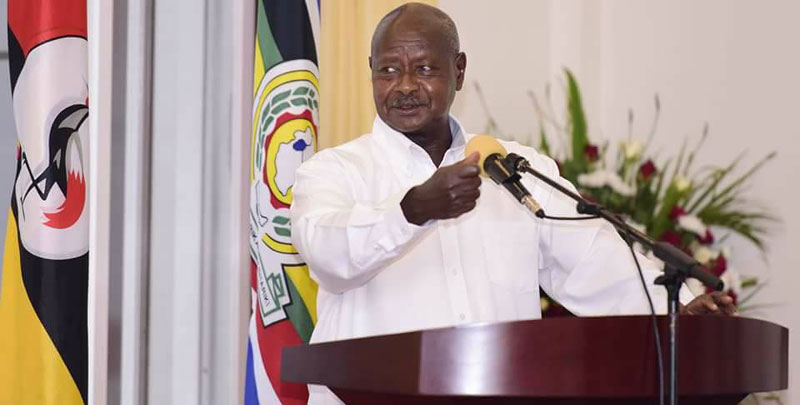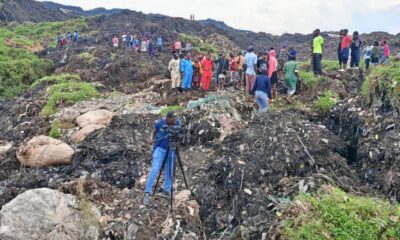Guest Writer
Police reshuffles
Are they good for Museveni or for Uganda?
At a time when the atmosphere was full of fear and uncertainty due to the spike in crime across the country, President Museveni took a popular step by shuffling the heads of the security organs – the Minister of Security as well as the Inspector General of Police.
President Museveni has received overwhelming public support following the sacking of Gen. Kayihura, and his adversary Gen. Henry Tumukunde. Kayihura was replaced by his former deputy Okoth Ochola while Gen. Tumukunde was replaced by Gen. Elly Tumwine.
Although the President made a score by saving us the unending fights between the two army generals, which in some way had compromised national security, his choice of appointment remains questionable as to whether it’s for his own survival or good for the country.
First, the President has continued to show his lack of confidence in civilian police which is the ideal choice of police for majority Ugandans. We expected the President to have keenly observed Kayihura’s method of work which tainted a bad image on the force, in order to inform why it is relevant to demilitarize police.
President Museveni is fond of making appointments based on his political convenience without caring whether it is in the country’s best interest’s. In the first place he appointed Gen. Kayihura, best known to him as an NRM cader to superintend over the country’s police force.
This explains why the force was perceived to be partisan hence used as a tool to advance Museveni’s rule. This was a kind of a force which would parade all forms of sophisticated machinery to suppress and demobilize opposition yet on the other hand failed to counter crime and multiple murders.
Police under Kayihura was also castigated for being the principal violator of human rights and freedoms including the rights of journalists, politicians and civil society activists. In all these undertakings, the force proved to be working on orders of the regime, to the extent that it would go bare knuckles with whoever opposed the president. It’s also during Kayihura’s tenure that we witnessed militia groups taking on police’s functions and worst of all engaging in organized crime which went unexplained.
The new face of Police
IGP Okoth Ochola (if he seals Parliamentary approval) claiming the top spot of the country’s law and enforcement organ, is a source of hope that we are yet to witness some semblance of professionalism in the force bedevilled by militarism. This is largely because of the fact that the new IGP has civilian training and experience.
However, there are divergent views that have been advanced to suggest that his power and influence could be usurped by his deputy – another youthful military general Brigadier Sabiiti Muzeyi.
think, like many Ugandans have opined, that the appointment of Brigadier Sabiiti Muzeyi as Deputy IGP is a clear indication that we are likely to see more of the same. Further more, it is not that the newly appointed DIGP has been harshly judged even before his approval by Parliament but like biblical teachings state, “every man will be judged by his works,” Ugandans are right to perceive his appointment as being political and calculated.
It has been alleged that it was Brigadier Sabiiti who commanded the SFG to attack Parliament during the acrimonious and debate on the lifting of the Constitutional age-limit. And as a result many MPs sustained injuries.
If approved as DIGP, Brigadier Sabiiti is likely to continue trekking the same path as his predecessor since they are both made of the same fabric. It will be so unfortunate because he (sabiiti) won’t work by his conscious because he will always want to appease the appointing authority. Therefore, we should be expectant to see a force with a military approach embedded in its operations.
Musevenism police Vs Uganda Police Force
The former is highly driven by the whims of the appointing authority which has denied Ugandans a chance to embrace the latter. Just like other institutions, the Uganda Police Force has not been spared by the rampant institutional breakdown at the expense of Museveni. Being a national security force that breathes “orders from above,” police has totally failed to be accountable to the citizens.
Most appointments and/or recruitments within the top leadership of the force are still influenced by sectarian sentiments which has hindered inclusiveness and perhaps explain the dearth of professionalism in police. As such there are still biting challenges that the force is still grappling with, such as poor standards of living (housing) for officers, poor pay, limited capacity to combat crime, corruption among others.
What needs to be done?
As Gen. Tumukunde intimated days before his sacking that, “security was the biggest asset at the disposal of the ruling government,” I would like to see a Uganda where security is a basic and that citizens are not deprived of such. We can achieve this by respecting security institutions, especially police which many citizens interface with. We need to erect a civilian police force whose priority doesn’t lie in procuring and stocking cans of tear gas but one which can guarantee the security of Ugandans.
The top leadership of police needs to consider strengthening the capacity of the officers to adopt skills for combating the changing patterns of crime; recruitment of personnel within the force should be based on merit; And critical among all is that the welfare of police officers should be improved to minimize the malaise of corruption as well as misconduct. Finally, we should work towards a people-centred police which is not on life support of Museveni.
Badru Walusansa is a Commonwealth Correspondent
Comments



















